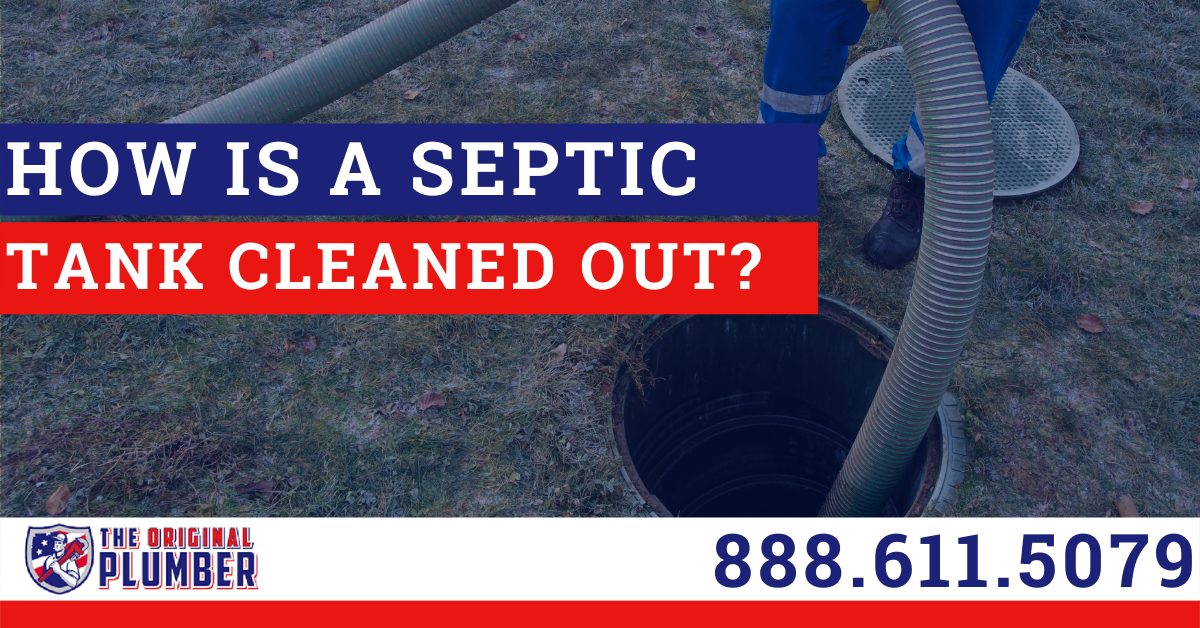Septic tanks are small tanks that can be connected to the plumbing system of homes. They are sometimes used in rural areas where there is no public sewer line installed or used. Septic systems use helpful bacteria to break down solids that accumulate in the tank after moving through sewage pipes.
Cleaning a septic tank can be a dirty job, but with the help of a septic service professional, it can be safe. If you’re wondering how a septic tank is cleaned out, here’s a behind-the-scenes look at how our professionals handle the job.
How a Septic Tank is Cleaned, Step-by-Step
While you can clean your septic tank out yourself, we do not recommend this for safety reasons. If you do it incorrectly, you can damage your water storage tank, improperly dump the solid waste, or fail to clean up the entire tank.
Our team of septic system professionals can quickly locate and find your tank. Our Atlanta plumbers can help fill your tank as required. Our team also has the skills and training required to remove and dispose of septic enwaste properly. Our crew has the skills necessary to safely clean the container out and can also use the equipment necessary for proper operation, such as a pumper in the tank.
Step 1: Finding the Tank
If you’re not sure where your septic tank is, you can start from the sewer pipe line. This is in the lower level of your home. If you aren’t sure, we also can look for raises in the horizon to indicate where a tank might be buried.
Step 2: Accessing the Top of the Tank
Chances are, your tank is buried underground. Our crew will dig in a noninvasive way so we can access your tank if you don’t have a riser. Risers are added to the tops of septic tanks that make it easier to access the lid without digging.
Step 3: Tank Inspection
Next, we’ll give your tank a thorough inspection. When you get your tank inspected, we mainly look for cracks or any other damage that we should know about before we begin septic tank cleaning or septic tank pumping. If you have a baffle, we also inspect your baffle filter before cleaning and replacing it.
Step 4: Measure and Test the Septic Sludge Depth
We can measure and test the depth of your sludge and scum layer at the bottom of your tank. We do this with PVC pipes. The pipes should stain after sticking it in the sludge layer for a few minutes. We can then measure the stain from the sludge and scum levels to see how deep it goes.
Step 5: Pumping the Septic Tank
Regularly having your septic tank pump can save you from costlier issues down the road. The smaller your tank, the more frequently you’ll need septic tank pumped. But three to five years is fairly standard regardless of the septic tank size.
Our team uses a pump that takes out any solids that haven’t broken down by the anaerobic bacteria in your septic tank. The sludge is moved into a container for safe disposal.
Septic Tank Pumping vs. Septic System Cleaning
With a septic tank, sometimes the terms “pumping” and “cleaning” go hand-in-hand as septic tank pumping is part of the cleaning process. This difference might appear minor, but it really can affect your septic system’s performance if you need a deeper clean.
Pumping a septic tank means we remove the liquid solids. We’ll also pump out the sludge so this way, your septic tank doesn’t run the risk of getting backed up.
During a septic tank cleaning, we focus more on the bottom of the tank. When we clean a septic tank, we’ll clear out all of the sludge that’s become compacted and remove the water.
Our professionals can determine if you need septic cleaning or septic tank pumping when we perform routine maintenance on your tank. Call us for an inspection in the Atlanta metro area. Either way, regular maintenance can help you prevent expensive issues and keep your tank running smoothly. Septic systems can last as long as forty years when properly maintained.
Work With a Trusted Septic Tank Professional Today
At The Original Plumber & Septic, we provide any and all septic system services you might need. From septic installation to repair, our crew has the experience and skill to get the job done right. We pride ourselves on fair, honest, and upfront pricing so you won’t have any surprises.
Are you noticing some signs of a failing septic tank system and need your tank pumped right away? Don’t worry! Our crew is available 24/7 in the event of an emergency. We service communities in Northern Georgia and the Atlanta metro area.
Frequently Asked Questions
How do I care for my septic system?
A typical home septic tank system must be monitored by septic service technicians every three to five years. A septic system with mechanical components such as mechanical float switches, electric float switches, or hydraulic pumps could well receive a more frequent inspection.
A service contract is crucial because alternative systems require mechanized parts. Four important factors influence the frequency of septic tank pumping. The frequency of septic tank pumping is the amount of time required to pump a tank every three to five years. Maintenance and repairs aren’t rushed or difficult, so if you don’t know when the last septic tank pumping was, just let us know.
What happens if I don’t regularly have my septic tank pumped?
Without regular pumping, your septic system is at risk of an overflow. Unprocessed water flow will flood up the drain field with untreated dirt and sediments if there is an overflow. In addition, the water produced via landfill can carry infectious diseases such as hepatitis and viral infections. Remember, this is carrying your waste water, so the last thing you want is a sewage backup!
What are the signs that your septic system is full?
If you’re not sure how long it’s been since your septic tank has been pumped, keep an eye out for these warning signs. These are common signals that your septic tank is full.
- Pooling water or standing water over your septic tank’s location in your yard
- An increase of flora or fauna in your yard, especially over or near your septic tank
- An unpleasant smell coming from your yard
- Difficulty flushing your toilets that don’t stem from a clog
If you see any of these plumbing problems arise, give us a call right away. Our team can help you solve these issues before you run into a sewage backup.
What preventive measures can I take?
One of the easiest ways to stay ahead of the curve beyond having your septic tank pumped regularly is to be aware of what goes down your toilet.
- Make sure you use septic safe toilet paper. Other types of toilet paper can be too thick and clog easily in your septic tank.
- Don’t put anything that isn’t human waste down the toilet. This includes cat litter, diapers, baby wipes, feminine hygiene products, and tissues.
- Be cautious of how much you use your water. If you suddenly start doing more loads of laundry, taking longer showers, or using your washing machine more frequently, this can potentially overwhelm the septic system.
- Don’t put any biological additives into your septic system. This can be harmful to the helpful bacteria in your tank.
If you use a garbage disposal, be careful what you put down it. While you can use a garbage disposal with a septic tank, we recommend doing so sparingly. Remember, anything that isn’t food should go in the trash.




